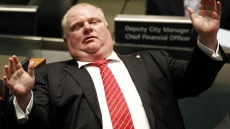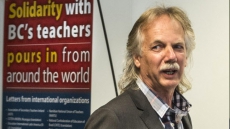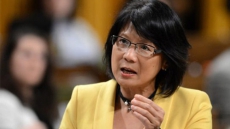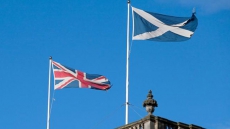OTTAWA - "Under our government, we have lowered greenhouse gas emissions and, at the same time, been able to grow the economy." — Prime Minister Stephen Harper in the House of Commons, Oct. 7.
"For the first time ever, greenhouse gas emissions decreased thanks to our plan and, at the same time, there was economic growth." — Harper in the Commons, Oct. 7.
———
A report this week from the federal commissioner of the environment and sustainable development prompted some tough questions from the Opposition in the House of Commons.
Commissioner Julie Gelfand found that Canada is not on track to meet its international commitment on reducing greenhouse gas emissions.
"We found that federal measures currently in place will have little effect on emissions by 2020," Gelfand said.
Yet when Prime Minister Stephen Harper was asked about the report's implications, he told parliamentarians, he said Canada's greenhouse gas emissions went down even as the economy grew.
How can one square the findings of the environment commissioner, an independent officer of Parliament, with the prime minister's words to the same institution?
Spoiler alert: The Canadian Press Baloney Meter is a dispassionate examination of political statements culminating in a ranking of accuracy on a scale of "no baloney" to "full of baloney" (complete methodology below).
This one earns a rating of "a little baloney" — the statement is mostly accurate but more information is required. Here's why.
THE FACTS
Under the 2009 Copenhagen Accord, the Conservative government committed Canada to cut GHG emissions 17 per cent below 2005 levels by 2020.
The Canadian economy as a whole emitted 736 megatonnes of greenhouse gases in 2005, according to Environment Canada, a number that fell to 728 megatonnes in 2006 before rebounding to 749 and 731 megatonnes in the following two years.
In 2009, amid a global recession that depressed demand for fossil fuels, Canada's GHG emissions plunged to 689 megatonnes and have been slowly rising since, reaching 699 megatonnes in 2012.
Canada's gross domestic product, meanwhile, was $1.4 trillion in 2005 and came in at $1.95 trillion in the second quarter of 2014.
"In 2012, Canada's greenhouse-gas emissions were 5.1 per cent lower than in 2005, while the economy grew by 10.6 per cent during the same period," Environment Canada reported in April.
Canadian emissions for 2013 have not yet been released by the government.
The federal environment commissioner, meanwhile, has found that following up on a 2012 study, "the evidence is stronger that the growth in emissions will not be reversed in time and that the (Copenhagen) target will be missed."
Gelfand also said provincial measures have done much of the heavy lifting on curbing GHG emissions. In fact, without provincial actions, Canada's emissions would likely now be higher than when the Conservatives came to office.
WHAT THEY SAY
David McLaughlin, the former head of the National Round Table on the Environment and the Economy, has been studying the linkages between economic and environmental performance for years.
He says Harper's statements to the House of Commons are factually accurate in that Canada's overall emissions are currently lower than they were when the Conservatives came to office in 2006 and the economy has grown since then.
A multitude of factors are involved in those lower emissions, notably the global financial crisis that began to bite in 2008 and created a major recession in 2009.
"The economy went off a cliff," said McLaughlin, a former chief of staff to Conservative prime minister Brian Mulroney. "The emissions upward path dropped in conjunction with the drop in economic growth. Same thing happened in the U.S."
Harper's response in the Commons, said McLaughlin, "is a classic example of accuracy versus veracity."
"It's accurate without being true — in the sense that it's accurate the numbers show that, but it's not true in showing we're on a path to reducing overall emissions and to meet targets."
Harper is on shakier ground, however, when he claims emissions decreased "thanks to our plan."
Industries are more energy efficient, they've moved away from energy-intensive manufacturing to service industry work, and provincial measures — notably Ontario's move away from coal-fired electricity generation — have also played a major role.
"It's not true that it's on the basis of a series of distinct government actions, at the federal level anyway," McLaughlin said.
THE VERDICT
The prime minister was perfectly correct in stating that Canada's greenhouse gas emissions, at least as of the last public accounting in 2012, are lower than they were in 2005.
He is also correct in stating that absolute emissions are lower despite a Canadian economy that has grown during the same time period.
However, the trend line for overall Canadian emissions remains on an upward trajectory and the global economic downturn of 2009 correlates directly to the sudden reduction of emissions below 2005 levels.
Gelfand also chastised the government for failing to bring in emissions regulations on the oil and gas sector — the fastest-growing emitter — and said Ottawa lacks an overall plan to achieve its international climate change commitments.
For these reasons, Harper's statement on Canada's greenhouse gas emissions contains "a little baloney."
METHODOLOGY
The Baloney Meter is a project of The Canadian Press that examines the level of accuracy in statements made by politicians. Each claim is researched and assigned a rating based on the following scale:
No baloney — the statement is completely accurate
A little baloney — the statement is mostly accurate but more information is required
Some baloney — the statement is partly accurate but important details are missing
A lot of baloney — the statement is mostly inaccurate but contains elements of truth
Full of baloney — the statement is completely inaccurate
———





